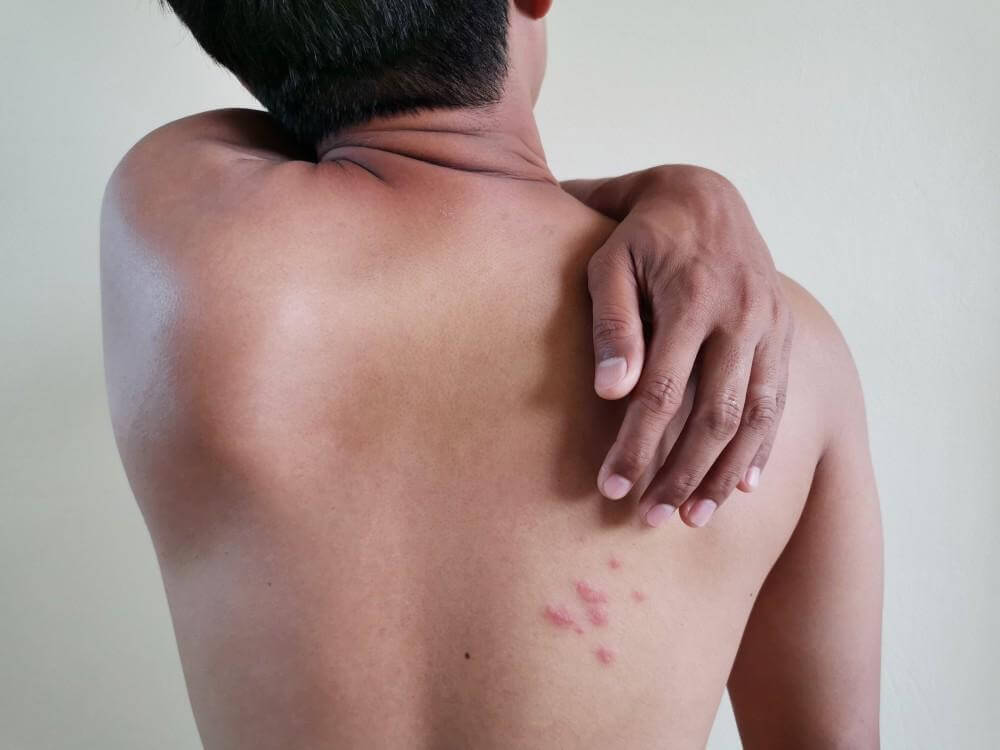Shingles, also known as herpes zoster, can be a painful experience. While the discomfort often disappears with the rash, some individuals develop postherpetic neuralgia, where the pain lasts long after the rashes heal. Understanding the symptoms, possible causes, and available treatments can help you manage this challenging condition.
Why do shingles cause pain?
Shingles occurs when the varicella-zoster virus, responsible for chickenpox, reactivates in the body’s nervous system. This viral reactivation leads to herpes zoster, a painful infection affecting nerves leading to the skin’s surface.
Typically, shingles pain lasts for 3 to 5 weeks. But in some cases, the pain lasts longer than the blistering rash. This persistent pain, lasting longer than three months after the rash has cleared, is called postherpetic neuralgia (PHN).
PHN can range from mild tingling or numbness to intense burning, stabbing, or shooting sensations. It can even make your skin unusually sensitive to light touch or temperature like a breeze feeling cold and painful.
While 10-18% of people who get shingles experience PHN, it can improve over time with proper treatment and support.
How does shingles pain feel?
Shingles pain varies from mild to intense. Before pain, you can experience tingling, burning, or itching in the area where the rash will occur. The rash typically appears in a strip on one side of the torso.
In some people, minimal movements, such as a gentle breeze or the touch of bedsheets, can trigger pain, while others may only experience itching. Additionally, systemic symptoms like fever, headache, and fatigue may accompany the pain.
Where might you experience pain?
Shingles pain usually occurs where the rash appears. Inflamed nerves beneath the skin trigger pain. In some people, even if the rash disappears, postherpetic neuralgia can leave lasting pain along the rash’s path.
Common locations for shingles pain include:
- Back – The pain can range from mild to intense and feel like burning or sharp stabbing. It can also occur constantly or in intervals.
- Chest – The pain usually occurs on one side and can feel like burning, itching, and tingling.
Why is shingles pain worse at night?
Sleeping with shingles can be challenging. This happens due to the following reasons:
- Daytime activities usually act as a distraction from shingles pain. But at night, the pain can take center stage in your mind, making it harder to sleep.
- Even gentle touches, like the weight of bedsheets, can trigger pain receptors in the sensitive rash area. Constant stimulation might exacerbate pain and make it more difficult to fall asleep.
When does shingles pain peak?
The timing of shingles pain peak varies among individuals. Tingling, itching, and systemic symptoms may develop within 1 to 5 days of infection, and the rash can be visible soon after.
Seeking treatment within the first three days of the rash can minimize pain and speed up healing.
What are the treatment options for shingles nerve pain?
Several treatments are available for shingles nerve pain:
- Some treatments for calming rashes:
- Take cool baths or showers to soothe the skin.
- Apply wet cold compresses to reduce pain and itching.
- Rub calamine lotion on the affected areas.
- Your doctor might recommend over-the-counter (OTC) pain and rash relief:
- Oral medicines – ibuprofen or acetaminophen
- Topical creams – lidocaine, capsaicin, aluminum acetate, and aloe vera
- Additionally, doctors often prescribe antiviral medications to combat shingles, such as:
- Acyclovir
- Famciclovir
- Valacyclovir
When to seek medical help?
You should contact your doctor if:
- The rash becomes more painful
- The rash is infected
- Fever accompanies the rash
- The rash spreads across your entire body
While managing shingles pain, taking OTC medications and prescription treatments can significantly improve symptoms and enhance healing. Early intervention is essential to minimize prolonged discomfort and complications associated with the disease.
Moreover, consider discussing with a healthcare provider the importance of shingles vaccination, a preventive measure that can reduce the risk and severity of the disease.
You may also like
-
Embrace the Essence of the North: Experience Clean Nicotine with Premium Nordic Spirit
-
Discover Treatment Options For Adderall Addiction in Houston, TX
-
How does body chemistry impact your response to HHC gummies?
-
Role of synthetic urine kits in laboratory calibration
-
How can nutrition support anabolic steroid results?


